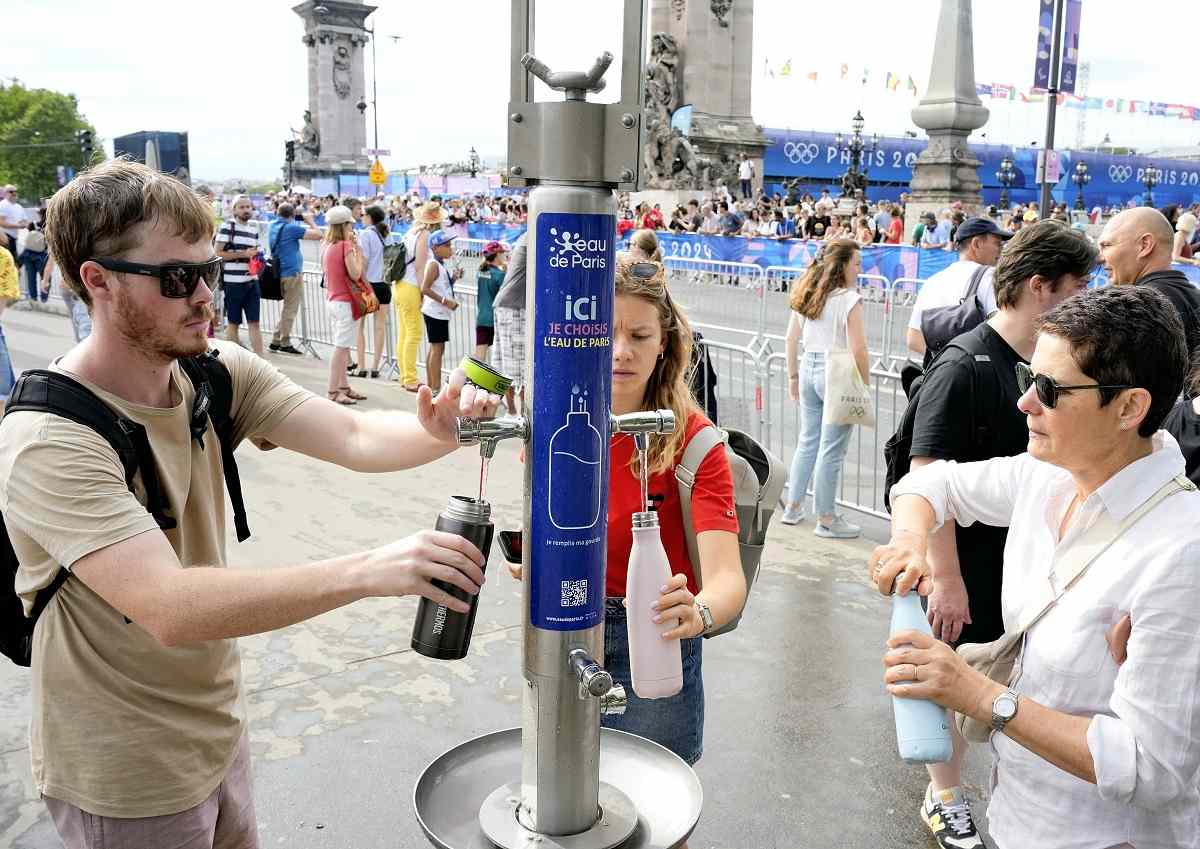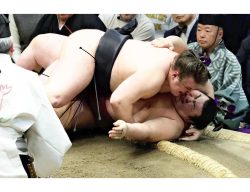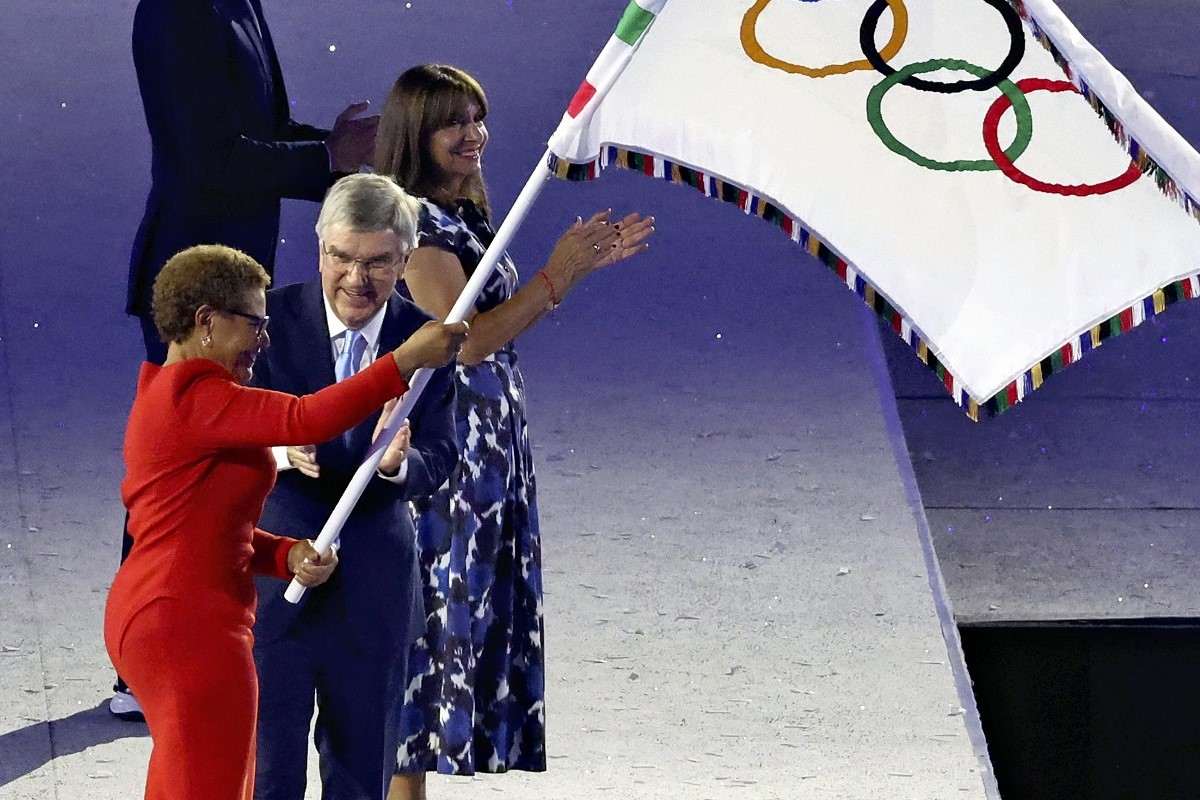Paris Games Aimed For Legacy of ‘Sustainable Olympics’; Some Athletes Critical of Focus on Environmental Measures

Spectators fill their bottles at water points in Paris on Aug. 3.
17:49 JST, August 13, 2024
The International Olympic Committee is promoting a sustainability strategy to reform the Olympic Games amid climate change and the increased costs of hosting the Games. This year’s Paris Olympics, the first Olympics to have spectators since the COVID-19 pandemic, was a test case for that approach.
The Olympics cost their host countries an enormous amount of money. Furthermore, as global warming worsens, fewer countries are able to host Winter Olympics. The IOC recommends utilizing existing and temporary facilities as a way to overcome these challenges, believing this will help lower building costs and greenhouse gas emissions from construction.
At the Paris Games, 95% of the competition venues were existing or temporary facilities. They included tourist attractions such as the Palace of Versailles and Place de la Concorde, dazzling athletes and spectators alike.
The Paris 2024 Organizing Committee for the Olympic and Paralympic Games used renewable energy, such as solar power, to supply electricity for the venues and worked to reduce the use of plastic, which causes marine pollution.
Tony Estanguet, president of the organizing committee, said it did not compromise, in order to achieve its ideal. However, the Paris Olympics are said to have cost about €9 billion, or ¥1.45 trillion. There was also criticism about prioritizing the environment at the expense of the athletes’ convenience.
Reducing use of Plastic
Spectators formed long lines in front of water points at an arena near the Eiffel Tower in Paris, filling their own bottles to slake their thirst.
Sights like this were common, as water points were set up at all the venues by the Paris Games organizing committee to reduce the use of plastic bottles. Restaurants also eschewed plastic for plates made of paper and other materials.
This kind of environmental consideration was prompted by the reform agenda approved by the International Olympic Committee in 2014. In the agenda, the IOC encourages cities to use existing or temporary structures to reduce the costs of hosting the Olympics. To that end, cities are allowed to hold some events outside the host municipality.
After the previous Tokyo Games were postponed due to the COVID-19 pandemic, the Tokyo organizing committee worked to simplify its Games based on the 2014 reform package.
The revised version of the reform package announced in 2021 puts even more emphasis on sustainability, saying, “The Olympic Games of Paris 2024, Milano Cortina 2026 and Los Angeles 2028 are the first to truly embrace and reflect this new strategic direction.”
The Paris Games organizing committee was strongly aware of the agenda and U.N. social development goals, among other issues. They aimed to halve greenhouse gas emissions from those of the 2012 London and 2016 Rio Games, which were both held before the outbreak of the pandemic.
In downtown areas in Paris, fans were encouraged to use not only public transportation but also bicycles as part of efforts to reduce exhaust gas. A 415-kilometer network of new and existing cycle lanes was established to connect venues and other locations, and bicycle parking facilities for more than 20,000 bikes were prepared.
The only newly built arena in Paris was equipped with seats made from plastic waste by a startup that is based in a deprived neighborhood to address unemployment issues.
No air conditioning
However, many athletes voiced dissatisfaction. Bedrooms at the Olympic Village were cooled with a system of water pipes beneath the floor, which was designed to reduce power consumption. However, there were some hot days with temperatures of more than 30 C, and many athletes complained about their rooms not having air conditioning.
Teams from some countries, including Japan, provided their athletes with portable air conditioning units supplied by the organizing committee. “I was distracted by the loud sound of the portable air conditioning,” one Japanese athlete said.
Some athletes from South Korea complained that the shuttle buses connecting the Olympic Village and their competition venues were like a sauna because air conditioning was insufficient. As a result, they moved to a hotel.
For the food at the Olympic Village, the organizing committee sourced most of the ingredients from within France to reduce GHG emissions generated from transportation, and increased the use of organic vegetables. However, the food was unpopular, with some athletes demanding more meat.
France tried to clean the Seine to make the river a symbol of their environmental consideration, but the triathlon event was postponed because the water quality in the river deteriorated after rain fell. Some athletes also said the Seine’s current was strong.
Follow-up survey
The Paris Games took various steps to warn people about global warming. “Our goal is to leave a legacy of bringing about changes to society and establishing new sustainability standards for event operations,” an official at the organizing committee said proudly.
A committee of experts independent from the organizing committee will analyze the ripple effects of those sustainability measures, as well as those of a program to make sports a habit that has been implemented at schools across France since before the Olympics.
A report on the impact assessment will be released next year and then again five years on, in keeping with guidance issued a year ago by the Organization for Economic Cooperation and Development.
These reports will help people decide whether the benefits are worth the hosting costs.
Holger Preuss, a professor of sport economics and sport sociology at the Johannes Gutenberg University in Germany who chairs the expert committee, said the Paris Games are the first Olympics whose legacy will be fully evaluated. Future Olympics will be able to learn a great deal from this evaluation, Preuss said.
If the Paris Games are proved to have helped people change their behaviors or awareness, that can be called a true legacy.
Top Articles in Sports
-

Aonishiki Tops Atamifuji in Playoff to Win New Year Grand Sumo Tournament in Ozeki Debut
-

Japan’s National Baseball Team Adds 11 Members to Participate in Upcoming World Baseball Classic (WBC)
-

Milano Cortina 2026: Olympics-Torch Arrives in Co-Host Cortina on Anniversary of 1956 Games
-

Milano Cortina 2026: Japan’s Athletes Arrive in Italy for Milano Cortina Winter Olympics; Other Athletes to Arrive from Now
-

Milano Cortina 2026: Japanese Bobsleigh Athletes Lose Chance to Compete in Milano Cortina Olympics Due to Federation Mistake
JN ACCESS RANKING
-

Japan Institute to Use Domestic Commercial Optical Lattice Clock to Set Japan Standard Time
-

China Eyes Rare Earth Foothold in Malaysia to Maintain Dominance, Counter Japan, U.S.
-

Man Infected with Measles May Have Come in Contact with Many People in Tokyo, Went to Store, Restaurant Around When Symptoms Emerged
-

Japan, Qatar Ministers Agree on Need for Stable Energy Supplies; Motegi, Qatari Prime Minister Al-Thani Affirm Commitment to Cooperation
-

Australian Woman Dies After Mishap on Ski Lift in Nagano Prefecture
























